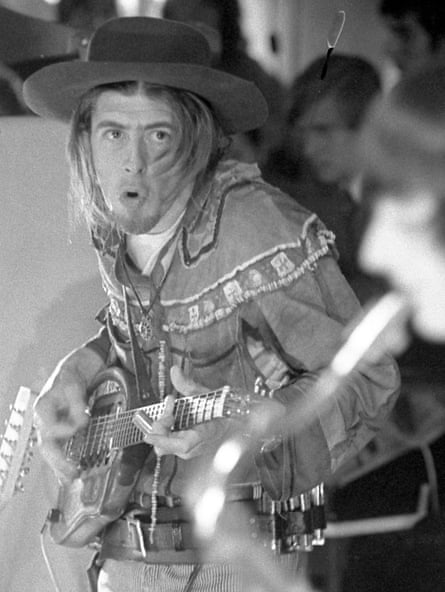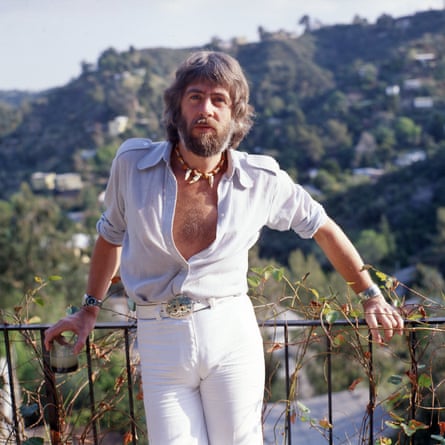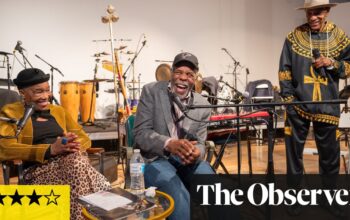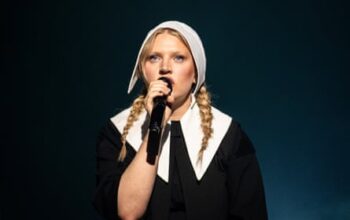Eric Clapton fled the Yardbirds in the spring of 1965, dismayed by the prospect of their latest single, For Your Love, bringing commercial success and thereby compromising his musical integrity. The 20-year-old guitarist found comfort in the arms of John Mayall, who welcomed him into his band, the Bluesbreakers. Within weeks their relatively purist approach to the blues, while not producing hit singles, had put them among the hottest attractions on the UK’s club circuit.
In Mayall, the young blues-hungry audiences knew they were in the presence of a slightly older figure whose knowledge and understanding of the idiom gave him an immense authority. In Clapton they had an idol who was one of their own.
In those days, it was instructive to see Mayall and his musicians on two occasions either side of Clapton’s arrival: the first time on a club tour accompanying the veteran American guitarist T-Bone Walker, playing the role of devoted and self-effacing disciples; the second time, suddenly bathed in the glow of cult worship.
Mayall, who has died aged 90, was one of the key progenitors of the British blues movement, a reliable and generous guide to a new generation whose members were devoted to learning the music that had emerged from the juke joints of the Mississippi Delta and the clubs of Chicago’s South Side.

He had come from Manchester to London in 1963 with a record collection that included Muddy Waters, Elmore James, Robert Johnson, Sonny Boy Williamson and many other more obscure bluesmen and women. He and Alexis Korner, a man of similar vintage and tastes, encouraged their acolytes to share and absorb the music they loved, eventually adopting it – in an audacious but ultimately fruitful act of cultural appropriation – as their own language.
Out of Korner’s Blues Incorporated and Mayall’s Bluesbreakers flowed a stream of prodigies who were soon ready to head off in their own directions. When Clapton left Mayall after a year – and one hugely influential album, Blues Breakers – to form Cream, he was replaced by the 19-year-old Peter Green. When Green left a year later, taking the group’s drummer, Mick Fleetwood, and bassist, John McVie, with him to form the first version of Fleetwood Mac, his place was taken by the 17-year-old Mick Taylor. Two years later Taylor would accept an offer from the Rolling Stones.
While they were with Mayall, they became the young gods of the club scene: a new generation of note-bending guitar heroes, beautiful long-haired boys whose skills had been attained through long hours of bedroom practice and were now delivered to audiences mesmerised by their virtuosity and the intensity of their demeanour. Thousands of miles and a universe in social conditions away from the land where the blues was born, young adherents in London, Manchester or Newcastle, musicians and fans alike, were adopting a cause, a mission.
Again like Korner, Mayall was not a figure these new audiences could see as one of their own. Although he had the long hair and clothes of a proto-hippie, there was something benignly professorial about his presence as he accompanied the soaring solos of Clapton, Green or Taylor.
He wasn’t content to churn out Delta blues covers – Mayall originals would fill entire albums, such as 1968’s Bare Wires which reached the UK Top 3. But as a blues singer, seated at his keyboards, he had nothing of the visual appeal of younger men then following the same path, including Mick Jagger, Rod Stewart, the Animals’ Eric Burdon or the Yardbirds’ Keith Relf, who were encumbered by nothing more than a harmonica. Delivering Otis Rush’s All Your Love or Elmore James’s Dust My Blues in a high, sandpapered voice, he was convincing but hardly as charismatic as the younger generation.

That never seemed to bother him. He was happy to pursue his own route within the spreading roadmap of the blues, whether adding horns, dispensing with a drummer or making solo records. That chapter of his life, and of the history of the blues in Britain, ended in 1969 when he moved to Los Angeles. By then, he had earned the gratitude of anyone who played in a blues band in the 1960s or watched as a local phenomenon mushroomed into the rock explosion of the next decade and beyond.
From his new base in southern California, he continued to recruit interesting musicians for tours, festivals and recording sessions. From Canned Heat, one of the American blues bands following in his footsteps, he took the bassist Larry Taylor and the guitarist Harvey Mandel for a lineup that also featured the violinist Don “Sugarcane” Harris. Moving towards jazz, he played with the trumpeter Blue Mitchell and the saxophonists Red Holloway, Ernie Watts and Clifford Solomon. The guitarists Sonny Landreth and Walter Trout were other collaborators at an early stage of their careers.
Mayall also switched back and forth between keyboards and guitar while developing his own songwriting in areas that moved away from the blues towards adjacent idioms, including folk, funk and cajun music. His discography eventually encompassed more than 70 albums, including live reunions of musicians from some of his early bands, and in 1993 his album Wake Up Call, featuring Mavis Staples and Buddy Guy, was nominated for a Grammy award.
His last album, The Sun Is Shining Down, was released in 2022. That year he also gave his final performance with his band at San Juan Capistrano in California. His enduring love of the blues had turned out not to be the investigation of a dead end but the key to a lifelong interest in exploring the music’s infinite possibilities.
Source: theguardian.com


